President of Russia Vladimir Putin: Participants in the plenary session, colleagues, ladies and gentlemen,
I am glad to welcome you all in Sochi at the anniversary meeting of the Valdai International Discussion Club. The moderator has already mentioned that this is the 20th annual meeting.
In keeping with its traditions, our, or should I say your forum, has brought together political leaders and researchers, experts and civil society activists from many countries around the world, once again reaffirming its high status as a relevant intellectual platform. The Valdai discussions invariably reflect the most important global political processes in the 21st century in their entirety and complexity. I am certain that this will also be the case today, as it probably was in the preceding days when you debated with each other. It will also stay this way moving forward because our objective is basically to build a new world. And it is at these decisive stages that you, my colleagues, have an extremely important role to play and bear special responsibility as intellectuals.
651f2f8b85f5405ce911e1c8.jpg
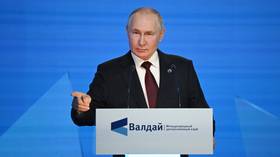
READ MORE Putin outlines desired principles of international relations
Over the years of the club’s work, both Russia and the world have seen drastic, and even dramatic, colossal changes. Twenty years is not a long period by historical standards, but during eras when the entire world order is crumbling, time seems to shrink.
I think you will agree that more events have taken place in the past 20 years than over decades in some historical periods before, and it was major changes that dictated the fundamental transformation of the very principles of international relations.
In the early 21st century, everybody hoped that states and peoples had learned the lessons of the expensive and destructive military and ideological confrontations of the previous century, saw their harmfulness and the fragility and interconnectedness of our planet, and understood that the global problems of humanity call for joint action and the search for collective solutions, while egotism, arrogance and disregard for real challenges would inevitably lead to a dead-end, just like the attempts by more powerful countries to force their opinions and interests onto everyone else. This should have become obvious to everyone. It should have, but it has not. It has not.
When we met for the first time at the club’s meeting nearly 20 years ago, our country was entering a new stage in its development. Russia was emerging from an extremely difficult period of convalescence after the Soviet Union’s dissolution. We launched the process of building a new and what we saw as a more just world order energetically and with good will. It is a boon that our country can make a huge contribution because we have things to offer to our friends, partners and the world as a whole.
651ee70320302730f5713d6f.jpg
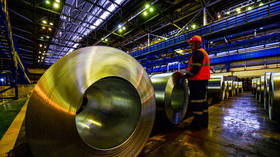
READ MORE Sanctions have helped Russia restructure economy – Putin
Regrettably, our interest in constructive interaction was misunderstood, was seen as obedience, as an agreement that the new world order would be created by those who declared themselves the winners in the Cold War. It was seen as an admission that Russia was ready to follow in others’ wake and not to be guided by our own national interests but by somebody else’s interests.
Over these years, we warned more than once that this approach would not only lead to a dead-end but that it was fraught with the increasing threat of a military conflict. But nobody listened to us or wanted to listen to us. The arrogance of our so-called partners in the West went through the roof. This is the only way I can put it.
The United States and its satellites have taken a steady course towards hegemony in military affairs, politics, the economy, culture and even morals and values. Since the very beginning, it has been clear to us that attempts to establish a monopoly were doomed to fail. The world is too complicated and diverse to be subjected to one system, even if it is backed by the enormous power of the West accumulated over centuries of its colonial policy. Your colleagues as well – many of them are absent today, but they do not deny that to a significant degree, the prosperity of the West has been achieved by robbing colonies for several centuries. This is a fact. Essentially, this level of development has been achieved by robbing the entire planet.
The history of the West is essentially the chronicle of endless expansion. Western influence in the world is an immense military and financial pyramid scheme that constantly needs more “fuel” to support itself, with natural, technological and human resources that belong to others. This is why the West simply cannot and is not going to stop. Our arguments, reasoning, calls for common sense or proposals have simply been ignored.
651efc2b2030270dce0c0d09.jpg

READ MORE Putin predicts ‘gradual collapse’ of dollar-based financial system
I have said this publicly to both our allies and partners. There was a moment when I simply suggested: perhaps we should also join NATO? But no, NATO does not need a country like ours. No. I want to know, what else do they need? We thought we became part of the crowd, got a foot in the door. What else were we supposed to do? There was no more ideological confrontation. What was the problem? I guess the problem was their geopolitical interests and arrogance towards others. Their self-aggrandisement was and is the problem.
We are compelled to respond to ever-increasing military and political pressure. I have said many times that it was not us who started the so-called “war in Ukraine.” On the contrary, we are trying to end it. It was not us who orchestrated a coup in Kiev in 2014 – a bloody and anti-constitutional coup. When [similar events] happen in other places, we immediately hear all the international media – mainly those subordinate to the Anglo-Saxon world, of course – this is unacceptable, this is impossible, this is anti-democratic. But the coup in Kiev was acceptable. They even cited the amount of money spent on this coup. Anything was suddenly acceptable.
At that time, Russia tried its best to support the people of Crimea and Sevastopol. We did not try to overthrow the government or intimidate the people in Crimea and Sevastopol, threatening them with ethnic cleansing in the Nazi spirit. It was not us who tried to force Donbass to obey by shelling and bombing. We did not threaten to kill anyone who wanted to speak their native language. Look, everyone here is an informed and educated person. It might be possible – excuse my ‘mauvais ton’ – to brainwash millions of people who perceive reality through the media. But you must know what was really going on: they have been bombing the place for nine years, shooting and using tanks. That was a war, a real war unleashed against Donbass. And no one counted the dead children in Donbass. No one cried for the dead in other countries, especially in the West.
This war, the one that the regime sitting in Kiev started with the vigorous and direct support from the West, has been going on for more than nine years, and Russia’s special military operation is aimed at stopping it. And it reminds us that unilateral steps, no matter who takes them, will inevitably prompt retaliation. As we know, every action has an equal opposite reaction. That is what any responsible state, every sovereign, independent and self-respecting country does.
651efb5285f540423117ff7a.jpg
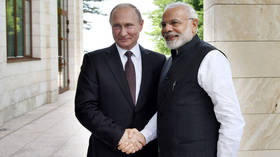
READ MORE Putin showers praise on Indian G20 leadership
Everyone realises that in an international system where arbitrariness reigns, where all decision-making is up to those who think they are exceptional, sinless and right, any country can be attacked simply because it is disliked by a hegemon, who has lost any sense of proportion – and I would add, any sense of reality.
Unfortunately, we have to admit that our counterparties in the West have lost their sense of reality and have crossed every line. They really should not have done this.
The Ukraine crisis is not a territorial conflict, and I want to make that clear. Russia is the world’s largest country in terms of land area, and we have no interest in conquering additional territory. We still have much to do to properly develop Siberia, Eastern Siberia, and the Russian Far East. This is not a territorial conflict and not an attempt to establish regional geopolitical balance. The issue is much broader and more fundamental and is about the principles underlying the new international order.
Lasting peace will only be possible when everyone feels safe and secure, understands that their opinions are respected, and that there is a balance in the world where no one can unilaterally force or compel others to live or behave as a hegemon pleases even when it contradicts the sovereignty, genuine interests, traditions, or customs of peoples and countries. In such an arrangement, the very concept of sovereignty is simply denied and, sorry, is thrown in the garbage.
Clearly, commitment to bloc-based approaches and the push to drive the world into a situation of ongoing “us versus them” confrontation is a bad legacy of the 20th century. It is a product of Western political culture, at least of its most aggressive manifestations. To reiterate, the West – at least a certain part of the West, the elite – always need an enemy. They need an enemy to justify the need for military action and expansion. But they also need an enemy to maintain internal control within a certain system of this very hegemon and within blocs like NATO or other military-political blocs. There must be an enemy so everyone can rally around the “leader.”
The way other states run their lives is none of our business. However, we see how the ruling elite in many of them are forcing societies to accept norms and rules that the people – or at least a significant number of people and even the majority in some countries – are unwilling to embrace. But they are still urged to do so, with the authorities continually inventing justifications for their actions, attributing growing internal problems to external causes, and fabricating or exaggerating non-existent threats.
651f049a2030270cfa0ba676.jpg
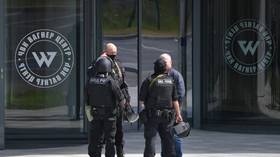
READ MORE Late Wagner boss had giant cocaine stash – Putin
Russia is a favourite subject for these politickers. We have grown used to this over the course of history, of course. But they try to portray those who are not willing to blindly follow these Western elite groups as enemies. They have used this approach with various countries, including the People’s Republic of China, and they tried to do this to India in certain situations. They are flirting with it now, as we can see very clearly. We are aware of and see the scenarios they are using in Asia. I would like to say that the Indian leadership is independent and strongly nationally oriented. I think these attempts are pointless, yet they continue with them. They try to portray the Arab world as an enemy; they do it selectively and try to act accurately, but this is what it comes down to. They even try to present Muslims as a hostile environment, and so on and so forth. In fact, anyone who acts independently and in its own interests is immediately seen by the Western elite as a hindrance that must be removed.
Artificial geopolitical associations are being forced onto the world, and restricted-access blocs are being created. We see this happening in Europe, where an aggressive policy of NATO expansion has been pursued for decades, in the Asia-Pacific region and in South Asia, where they are trying to destroy an open and inclusive cooperation architecture. A bloc-based approach, if we call a spade a spade, limits individual states’ rights and restricts their freedom to develop along their own path, attempting to drive them into a “cage” of obligations. In a way, this obviously amounts to the dispossession of part of their sovereignty, often followed by the enforcement of their own solutions not only in the area of security but also in other areas, primarily the economy, which is happening now in relations between the United States and Europe. There is no need to explain this now. If necessary, we can talk about it in detail during the discussion after my opening remarks.
To attain these goals, they try to replace international law with a “rules-based order,” whatever that means. It is not clear what rules these are and who invented them. It is just rubbish, but they are trying to plant this idea in the minds of millions of people. “You must live according to the rules.” What rules?
And actually, if I may, our Western “colleagues,” especially those from the United States, don’t just arbitrarily set these rules, they teach others how to follow them, and how others should behave overall. All of this is done and expressed in a blatantly ill-mannered and pushy way. This is another manifestation of colonial mentality. All the time we hear, “you must,” “you are obligated,” “we are seriously warning you.”
Who are you to do that? What right do you have to warn others? This is just amazing. Maybe those who say all this should get rid of their arrogance and stop behaving in such a way towards the global community that perfectly knows its objectives and interests, and should drop this colonial-era thinking? I want to tell them sometimes: wake up, this era has long gone and will never return.
651ec55d203027291f165cfa.jpg
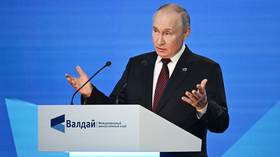
READ MORE Russia not looking for ‘more territory’ – Putin
I will say more: for centuries, such behavior led to the replication of one thing – big wars, with various ideological and quasi-moral justifications invented to justify these wars. Today this is especially dangerous. As you know, humankind has the means to easily destroy the whole planet, and ongoing mind manipulation, unbelievable in terms of scale, leads to losing a sense of reality. Clearly, a way out should be sought from this vicious circle. As I understand it, friends and colleagues, this is why you come here to address these vital issues at the Valdai Club venue.
In Russia’s Foreign Policy Concept, our country is characterised as an original civilisation-state. This wording clearly and concisely reflects how we understand not only our own development, but also the main principles of international order, which we hope will prevail.
From our perspective, civilisation is a multifaceted concept subject to various interpretations. There was once an outwardly colonial interpretation whereby there was a “civilised world” serving as a model for the rest, and everyone was supposed to conform to those standards. Those who disagreed were to be coerced into this “civilisation” by the truncheon of the “enlightened” master. These times, as I said, are now in the past, and our understanding of civilisation is quite different.
First, there are many civilisations, and none is superior or inferior to another. They are equal since each civilisation represents a unique expression of its own culture, traditions, and the aspirations of its people. For instance, in my case, it embodies the aspirations of my people, of which I am fortunate to be a part.
Outstanding thinkers from around the world who endorse the concept of a civilisation-based approach have engaged in profound contemplation of the meaning of “civilisation” as a concept. It is a complex phenomenon comprised of many components. Without delving too deeply into philosophy, which may not be appropriate here, let’s try to describe it pragmatically as it applies to current developments.
The essential characteristics of a civilisation-state encompass diversity and self-sufficiency, which, I believe, are two key components. Today’s world rejects uniformity, and each state and society strives to develop its own path of development which is rooted in culture and traditions, and is steeped in geography and historical experiences, both ancient and modern, as well as the values held by its people. This is an intricate synthesis that gives rise to a distinct civilisational community. Its strength and progress depend on its diversity and multifaceted nature.
Russia has been shaped over centuries as a nation of diverse cultures, religions, and ethnicities. The Russian civilisation cannot be reduced to a single common denominator, but it cannot be divided, either, because it thrives as a single spiritually and culturally rich entity. Maintaining the cohesive unity of such a nation is a formidable challenge.
We have faced severe challenges throughout the centuries; we have always pulled through, sometimes at great cost, but each time we learned our lessons for the future, strengthening our national unity and the integrity of the Russian state.
This experience we have gained is truly invaluable today. The world is becoming increasingly diverse, and its complex processes can no longer be handled with simple governance methods, painting everyone with the same brush, as we say, which is something certain states are still trying to do.
651f0994203027102f64b188.jpg
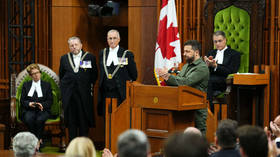
READ MORE Putin weighs in on Canadian parliament Nazi scandal
There is something important to add to this. A truly effective and strong state system cannot be imposed from the outside. It grows naturally from the civilisational roots of countries and peoples, and in this regard, Russia is an example of how it really happens in life, in practice.
Relying on your civilisation is a necessary condition for success in the modern world, unfortunately a disorderly and dangerous world that has lost its bearings. More and more states are coming to this conclusion, becoming aware of their own interests and needs, opportunities and limitations, their own identity and degree of interconnectedness with the world around them.
I am confident that humanity is not moving towards fragmentation into rivaling segments, a new confrontation of blocs, whatever their motives, or a soulless universalism of a new globalisation. On the contrary, the world is on its way to a synergy of civilisation-states, large spaces, communities identifying as such.
At the same time, civilisation is not a universal construct, one for all – there is no such thing. Each civilisation is different, each is culturally self-sufficient, drawing on its own history and traditions for ideological principles and values. Respecting oneself naturally comes from respecting others, but it also implies respect from others. That is why a civilisation does not impose anything on anyone, but does not allow anything to be imposed on itself either. If everyone lives by this rule, we can live in harmonious coexistence and in creative interaction between everyone in international relations.
Of course, protecting your civilisational choice is a huge responsibility. It’s a response to external infringements, the development of close and constructive relationships with other civilisations and, most importantly, the maintenance of internal stability and harmony. All of us can see that today the international environment is, regrettably, unstable and quite aggressive, as I pointed out.
Here is one more essential thing: nobody should betray their civilisation. This is the path towards universal chaos; it is unnatural and, I would say, disgusting. For our part, we have always tried and continue to try to offer solutions that consider the interests of all sides. But our counterparts in the West seem to have forgotten the notions of reasonable self-restraint, compromise and a willingness to make concessions in the name of attaining a result that will suit all sides. No, they are literally fixated on only one goal: to push through their interests, here and now, and do it at any cost. If this is their choice, we will see what comes of it.
It sounds like a paradox, but the situation could change tomorrow, which is a problem. For example, regular elections can lead to changes on the domestic political stage. Today a country can insist on doing something at any cost, but its domestic political situation could change tomorrow, and they will start pushing through a different and sometimes even the opposite idea.
A standout example is Iran’s nuclear programme. A US administration pushed through a solution, but the succeeding administration turned the matter the other way around. How can one work in these conditions? What are the guidelines? What can we rely on? Where are the guarantees? Are these the “rules” they are telling us about? This is nonsense and absurd.
651f57102030270f8b5e87db.jpg
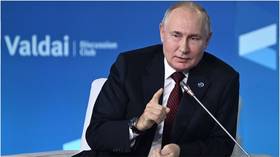
READ MORE Sanctions, estimated Ukrainian losses and Russia’s nuclear arsenal: Key takeaways from Putin’s Valdai speech
Why is this happening, and why does everybody seem comfortable with it? The answer is that strategic thinking has been replaced with the short-term mercenary interests of not even countries or nations, but the succeeding groups of influence. This explains the unbelievable, if judged in Cold War terms, irresponsibility of the political elite groups, which have shed all fear and shame and think of themselves as guiltless.
The civilisational approach confronts these trends because it is based on the fundamental, long-term interests of states and peoples, interests that are dictated not by the current ideological situation, but by the entire historical experience and legacy of the past, on which the idea of a harmonious future rests.
If everyone were guided by this, there would be far fewer conflicts in the world, I believe, and the approaches to resolving them would become much more rational, because all civilisations would respect each other, as I said, and would not try to change anyone based on their own notions.
Friends, I read with interest the report prepared by the Valdai Club for today’s meeting. It says that everyone is currently striving to understand and imagine a vision of the future. This is natural and understandable, especially for intellectual circles. In an era of radical change, when the world we’re used to is crumbling, it is very important to understand where we are heading and where we want to be. And, of course, the future is being created now, not only before our eyes, but by our own hands.
Naturally, when such massive, extremely complex processes are underway, it is hard or even impossible to predict the result. Regardless of what we do, life will make adjustments. But, at any rate, we need to realise what we are striving for, what we want to achieve. In Russia, there is such an understanding.
First. We want to live in an open, interconnected world, where no one will ever try to put artificial barriers in the way of people’s communication, their creative fulfilment and prosperity. We need to strive to create an obstacle-free environment.
Second. We want the world’s diversity to be preserved and serve as the foundation for universal development. It should be prohibited to impose on any country or people how they should live and how they should feel. Only true cultural and civilisational diversity will ensure peoples’ wellbeing and a balance of interests.
Third, Russia stands for maximum representation. No one has the right or ability to rule the world for others and on behalf of others. The world of the future is a world of collective decisions made at the levels where they are most effective, and by those who are truly capable of making a significant contribution to resolving a specific problem. It is not that one person decides for everyone, and not even everyone decides everything, but those who are directly affected by this or that issue must agree on what to do and how to do it.
Fourth, Russia stands for universal security and lasting peace built on respect for the interests of everyone: from large countries to small ones. The main thing is to free international relations from the bloc approach and the legacy of the colonial era and the Cold War. We have been saying for decades that security is indivisible, and that it is impossible to ensure the security of some at the expense of the security of others. Indeed, harmony in this area can be achieved. You just need to put aside haughtiness and arrogance and stop looking at others as second-class partners or outcasts or savages.
Fifth, we stand for justice for all. The era of exploitation, as I said twice, is in the past. Countries and peoples are clearly aware of their interests and capabilities and are ready to rely on themselves; and this increases their strength. Everyone should be given access to the benefits of today’s world, and attempts to limit it for any country or people should be considered an act of aggression.
Sixth, we stand for equality, for the diverse potential of all countries. This is a completely objective factor. But no less objective is the fact that no one is ready to take orders anymore or make their interests and needs dependent on anyone, above all on the rich and more powerful.
This is not just the natural state of the international community, but the quintessence of all of humankind’s historical experience.
These are the principles that we would like to follow and that we invite all of our friends and colleagues to join.
Colleagues!
Russia was, is and will be one of the foundations of this new world system, ready for constructive interaction with everyone who strives for peace and prosperity, but ready for tough opposition against those who profess the principles of dictatorship and violence. We believe that pragmatism and common sense will prevail, and a multipolar world will be established.
In conclusion, I would like to thank the forum’s organisers for your fundamental and qualified preparations, as always, as well as thank everyone at this anniversary meeting for your attention. Thank you very much.
Sent from my iPhone